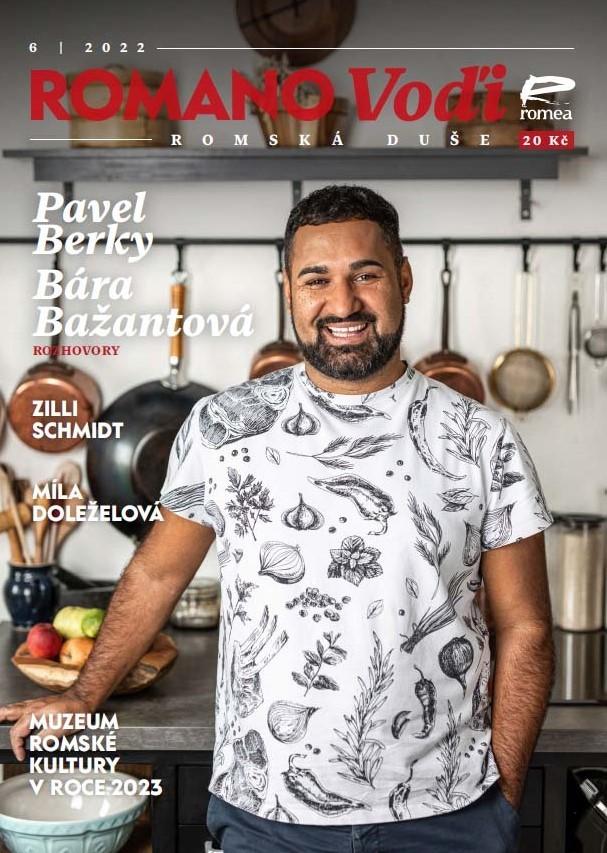Bára Bažantová: The Janov housing estate is classic trafficking in poverty, the Czech state has to resolve such situations
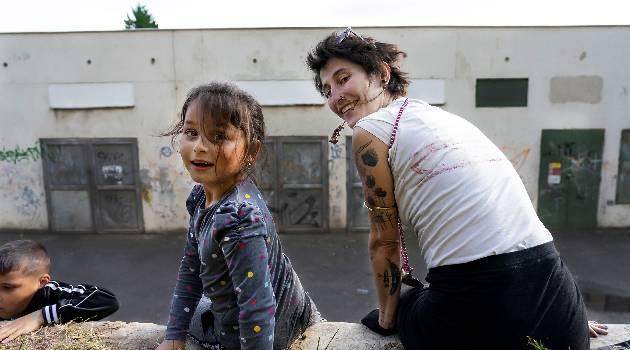
"In the trashed prefabricated apartment blocks, whether invoking spirits or watching the clouds over the chemical plant in Litvínov, we arrive at the very edge of (dis)trust and sound the depths not just of our ingrained prejudices, but also the strength of alliances being born and brief moments of shared joy," reads one review of the nonfiction book Hoří chemička, něco si přej [The Chemical Plant Is Burning, Make A Wish]. Its author, the activist and artist Bára Bažantová, approximates life at the Janov housing estate in Litvínov, Czech Republic as she sees it.
Q: What brought you to the excluded localities?
A: When I moved to Brno to go to school, to begin studying, everybody around me was, to my mind, unusually affiliated and anchored in different institutions, whether at school or at work. Naturally, I comprehend that institutions play a certain essential role in society, but it is also important not to forget about the life that transpires outside of them. I used to walk my dog on Cejl Street in Brno, and I liked how lively it was, much more than other parts of the city. For that reason, together with my friend, the painter Štěpán Brož (with whom we are creating the activist-artist group Fitnes3000), we decided to do the first of a series of exhibitions in the public space there. It was exactly on Cejl Street that we got to know the local children who turned up at the opening and who were interested in what we were doing and who we are. They also then became my first guides. Our friendship gradually intensified, the children started visiting our home, and once one of them stole somebody’s wallet. That apparently unfortunate incident led to our acquiring the trust of the adults in their family, specifically the grandmother, who appreciated that I addressed the issue with her and not with the police.
Bára Bažantová (1989) – is from Prague and studies in Painting Studio 1 at the Faculty of Fine Arts at the Brno University of Technology. In her output, which is mostly written, she covers the subjects of autonomy, independence in the broadest sense, social exclusion and poverty. She works in the artistic-curatorial platform Fitnes 3000, as an external colleague of the Ramus (Noise) group, and as editor of Bublina (Bubble) magazine, as well as being involved in recreational activities for children in socially excluded localities. She wrote the book Hoří chemička, něco si přej [The Chemical Plant Is Burning, Make A Wish] (tranzit.cz, 2022) about the Janov housing estate.
Q: Did Cejl Street inspire you to do other projects?
A: Rather its residents, primarily that specific family with whom I am still in contact. Getting to know their living situation inspired me to do another artistic/social project, which took place under the Brno platform Terén (“The Field”) in front of the Labor Office on Křenová Street and then in the bowels of Cejl. At the entrance to the building we installed a “Wheel of Fortune”, and anybody interested could spin for a job building a “Hunger Wall”, which was built and then dismantled on the patch of ground where Bratislavská Street intersects with Hvězdova Street. A couple of months later, with my colleague Šimon Sýkora, we had a residency at Brno’s House of Arts (Dům umění) and we created a month-long program for children of arts activities and field trips, we also visited the Museum of Romani Culture at the invitation of Madame Director Jana Horváthová and Ms. Veronika Lucassen, and we were taken care of brilliantly there.
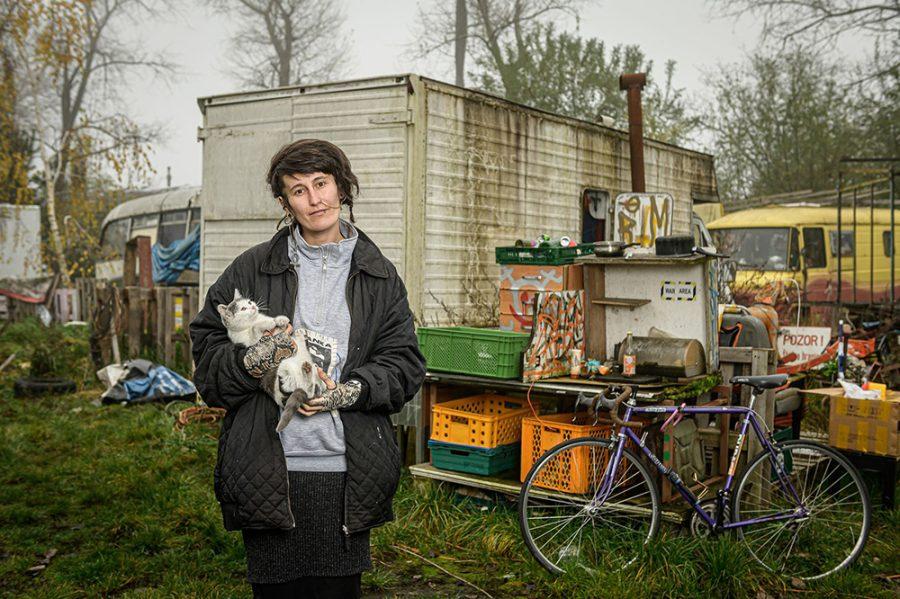
Q: You also collaborate with the Ramus (Noise) group, which is dedicated to radical social work. What does that mean?
A: I perceive it to mean that in a way it’s about a more equal dialogue, one in which I don’t act just as a provider of care, and the people whom I’m leading aren’t merely “clients”. The borders of the relationship aren’t determined from without, but from within, through mutual agreement. It’s not a relationship where the framework has been created by somebody else so the people entering into the relationship either “fit” or they don’t. Ramus is a labor of love, it’s a platform for common encounters, a way for young people, including people living with disabilities, to spend their free time actively, and it works chiefly because of the volunteers, without them it wouldn’t function. It conveys not just an idea, but also common experiences and feelings, and there is enormous strength in that.
Q: The MY Litvínov (“WE Are Litvínov”) group dedicates its free time to, among other things, giving its auspices to the happenings around the Libuše building, which is its next-door neighbor, at the Janov housing estate, where you spent some time and got to know its surroundings.
A: I ended up at Janov thanks to the tranzit.cz initiative, which offered me and my colleague Lenka Podroužek Polčová the opportunity to collaborate on a project in northern Bohemia. We chose Libuše because we liked the informal atmosphere of the project. However, we were also interested in Janov itself, which until then we had mainly just known from the events of 2008–2010, when several demonstrations targeting Romani residents transpired there. Libuše was a brilliant backup for us, but I soon understood that if I wanted to establish contact with locals, I had to go beyond it.
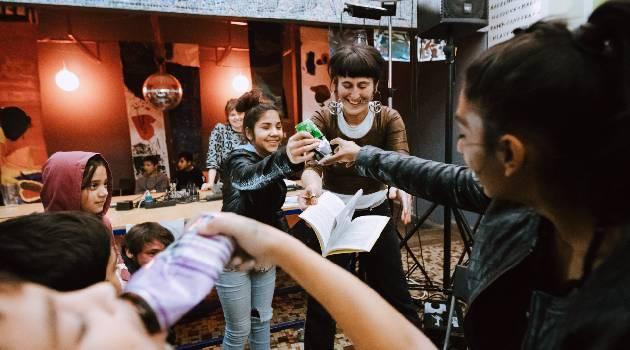
Q: That succeeded – you wrote the book Hoří chemička, něco si přej [The Chemical Plant Is Burning, Make A Wish]. What do you believe would aid the people at Janov with changing their quality of life for the better – I mean systemically, from above?
A: Systemically it would certainly aid them if we had regulation of rent and if the rights of tenants were treated seriously. According to what locals told me, it is customary there for a landlord to cut off the heat and water to an entire building because one or two families don’t pay. Some families are also paying rent of about CZK 15,000 [EUR 630], which is an absolutely crazy amount of money for an excluded locality and an apartment in a prefabricated highrise. It’s classic trafficking in poverty – most of the local units don’t belong to the town, some are owned by the housing cooperative called Krušnohor, some by the owner of a real estate empire, Radovan Vítek. Moreover, there’s basically nothing there at Janov, there’s no infrastructure. There are many nonstop shops, but they all offer the same goods, there isn’t any supermarket there, no pharmacy, no place to meet up, the bus runs just in the morning and the afternoon, when people go to work, otherwise there’s very little service. It is as if there is no assumption, generally, that people from Janov would want to travel into town. That could be another systemic transformation, including an acceptable cost for public transport, or ideally, free transportation.
Q: What’s it like at Janov with education, with school?
A: There is a primary school directly across from the Libuše building. I’ve not yet connected with any educators, but from afar it seemed odd to me that the children with whom I worked said they got good grades when it later transpired that their reading and writing skills were quite poor. I would say that there is not a very big chance that local children will go to a college preparatory secondary school instead of apprenticing. Moreover, there’s the commuting problem, in families counting every crown to cover food and rent, there’s not much money left over for children to commute daily to high school.
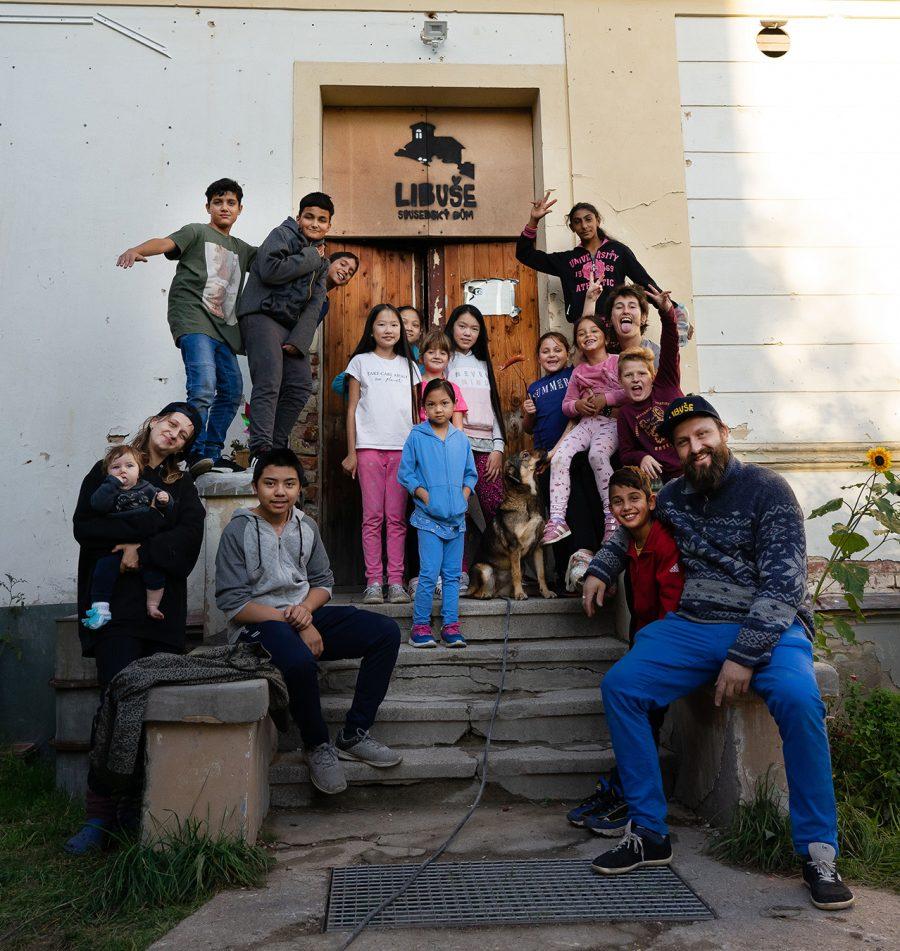
Q: What is the “way out” of Janov, then?
A: It’s quite complex and at a certain moment it’s hard to imagine, for locals. The children still have some dreams and ideas of what they’d like to do, for example, to be a pastry chef or a photographer, a graphic designer, do something “cool”, part of the “big outside world”. However, I frequently had the feeling from the adults and adolescents that when they spend a long time in such an excluded environment, it’s safer for them to stick with the certainties they know, even if those certainties aren’t very amenable, than to risk going into what is the unknown world for them beyond the borders of Janov, which does not always send them friendly signals. Their negative experience is imprinted onto their children, even if unconsciously so. Even those parents who are aware that education is important and who support their children in it, who do their best to send them to different activities and hobby groups so they will have a chance to get a foothold in the world beyond Janov, those parents are also addressing the dilemma of not wanting to lose their children if they go into the outside world. Moreover, they’re afraid to risk their rejection by that world. That cycle then just reproduces feelings of frustration.
A: How did you perceive your own role, as a gadji [non-Roma] who is well-off among Romani people struggling with poverty and social exclusion, what was that like as an experience?
A: It was a big experience, a stimulating one, it gave me a lot for the future. It also gave me wrinkles and what felt like a really ancient kind of exhaustion, the feeling that many people can do their best to aid such a place, to bring a little light of hope there, but realistically their endeavors will always be too small, basically in the bigger picture they don’t amount to anything revolutionary. My activities with the children bring them momentary pleasure, a shared experience, moments that do overcome, for a bit, all of these inequities – but that will not change their situation. I naturally believe that it does make sense to work in any way possible so that locals can have a more equal opportunity to choose their path. It is necessary to actually speak with them for that, not just to tell them something, but also to listen to them, to conduct a dialogue between them and the majority society, and basically that does not much exist yet. There’s a big mutual distrust and misunderstanding there. It is a resolvable situation, though. As an anarchist, I never would have believed that I would say such a thing, but unless the state starts addressing such situations, we have no chance of extricating ourselves from them. What’s more, the state should resolve them in collaboration with the nonprofit sector and with engagé groups and inividuals… At this moment it might not seem very optimistic, but I don’t see any other way forward.
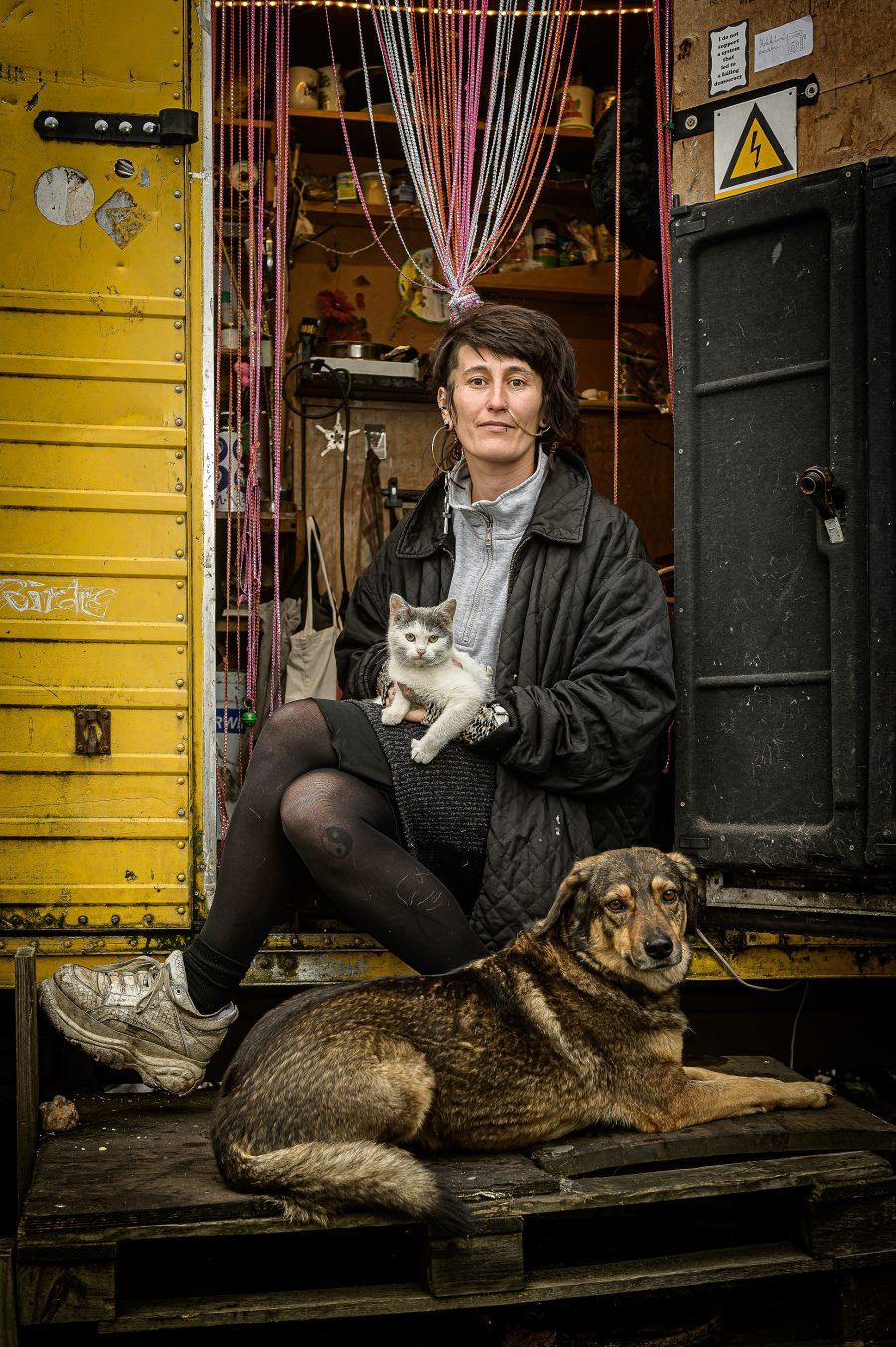
Q: What did you get out of working with Romani children?
A: I’m amused, for example, when they ask me questions that are different from the ones non-Romani children ask. I don’t believe it’s just the case, as is so frequently said, that we learn mainly from older people, we have a great deal to learn from children. We adults often don’t know what it’s like to be a child, how they directly perceive things. Children never let me forget what is essential. The children at Janov made it very clear to me that I am not somebody who can mentor them somehow, because I don’t know their world the way they do. Naturally, that is true. Through our mutual interactions, and through their interactions with each other, I can see there are many conflicts underway inside them that then bubble up out of their frustration with their mileu, but I don’t know how to get involved with those conflicts or whether I even should. I did grasp that in the moments when they were lacking that basic feeling of safety, or the sense that their needs had been met, they reacted much more harshly and warily. At the same time, so it doesn’t just sound heavy, they also bring me a lot of joy when I see their pleasure over our collaborations and the adventures we experience together.
Q: Are you planning to write a book for children, from their perspective?
A: I don’t know to what degree I would have the right to write a Romani children’s story if I’m no longer a child and not a Romani woman. Within the framework of our workshops we do our best to give them the floor, an opportunity to reflect on their experiences and stories. At the camp we began to put together a Czech-Romani dictionary, and part of it was meant to be a fairy tale, but it’s still being worked on, it’s not finished yet. Even my book, Hoří chemička, něco si přej [The Chemical Plant Is Burning, Make A Wish], does not speak for anybody, it is written from my perspective, describing the environment in which I ended up through my eyes and my emotions. That’s much simpler than writing a children’s book. Unlike children’s books, my book does not offer a magical or a new world of pleasure, and I might not even be able to imagine one. My book does not offer any answers, just a lot of questions. It seemed to me that it’s better to begin with those, seeking the answers should basically be more of our shared work. The fact that the answers aren’t in the book doesn’t mean I don’t consider it important to keep looking for them, though.
First published in Czech in Romano voďi 6/2022. www.romanovodi.cz
